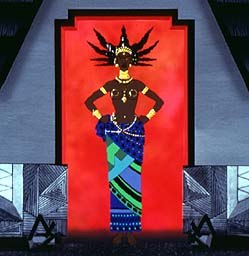Philippe Moins reviews Michel Ocelot's first feature film Kirikou and the Sorceress. Despite trials and tribulations, it is a charming success. Available in French and English.

A little boy is born and declares, "My name is Kirikou." All images courtesy Les Armateurs.
A little voice is heard in the belly of a pregnant woman: "Mother, give birth to me!" "A baby that speaks in its mother's womb should be able to give birth by itself," the mother answers. And so, a very small fellow comes into the world, cuts the umbilical cord himself, and declares, "My name is Kirikou." Tiny Kirikou is born in an African village upon which Karaba, the sorceress, has cast a terrible spell: the well has dried up, the villagers are held for ransom, and the men are kidnapped and never returned. "She eats them!" maintains the obsessed villagers. Karaba is a proud and cruel woman, surrounded by obediant and formidable fetishes. But Kirikou, just emerged from his mother's belly, wants to deliver the village from her malevolent possession. Through some fantastic adventures, he discovers the secret of her wickedness...
With this first feature-length animation, director Michel Ocelot has masterfully made the transition from shorts to long film -- a task all the more difficult since the film is the fruit of a broad European co-production, with the work divided between different studios in Angouleme (France), Brussels (Belgium), and Luxembourg, with animation also done in Riga (Latvia) and Budapest (Hungary). Though in his shorts he usually works with paper cut-outs, Ocelot had to abandon that technique for this feature, and opted for computer graphics using the "Tic Tac Toon" program. The main advantage of this software, which the director considered too slow otherwise, lay in its ability to copy, paste, and superimpose the "layers" practically to infinity. The results proved particularly desirable since their two-dimensional look approximated the folk painting of Africa. It is up to the spectator to reconstruct depth mentally.

Despite the uncertainty of a production that experienced one bankruptcy, Michel Ocelot has succeeded in maintaining a formal unity to the film, and charging it with a narrative rhythm suitable to the tale; which he has already managed to do in all of his previous works. The original French version benefited from the clever casting of Senegalese children and African actors living in France, which lent an air full of charm and authenticity, without turning into exoticism. Released in France at the same time as The Prince of Egypt, and shortly after Mulan, Kirikou was not crushed by the competition as some had predicted -- quite the contrary. Kirikou's promotion was based on its originality, and could also boast the fact that certain critics considered Kirikou a very French alternative to Hollywood productions. Released in a chain of smaller theaters by a new distribution company (Gebeka), the film racked up about 600,000 tickets in the first four months at the Hexagone. The release of Asterix and Obelix Against Caesar (the film, produced by Claude Berry, counts as the most expensive French production ever) caused further boxoffice rivalry, but by then Kirikou was already in a normal decline. Kirikou and the Sorceress, is an animated feature by Michel Ocelot, with original music by Youssou N'Dour. Producers: Armateurs (France), Odec Kid Cartoons (Belgium), and Monopoly (Luxemburg). Original version in French. Running time: 70 minutes. Released in France and Belgium. Translated from French by William Moritz. Philippe Moins is co-director of the Animation Festival of Brussels. He is also the regular animation reporter for the daily Belgian newspaper Le Matin ( The Morning Paper).







